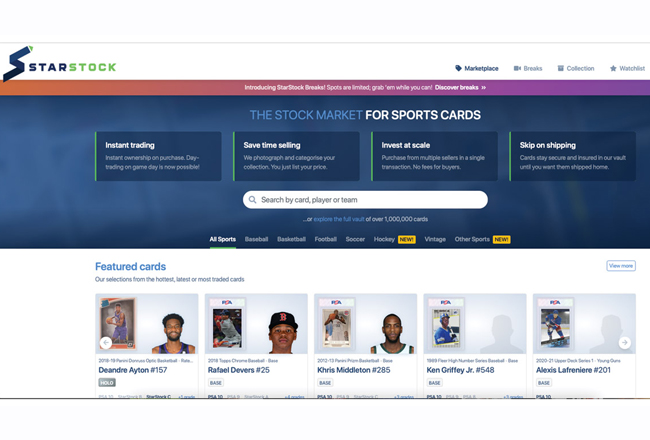As the Covid-19 pandemic triggered a return to old hobbies or gave people a reason to pick up new ones, industries such as sports card trading made something of a resurgence.
In early 2021, eBay reported that domestic trading card sales grew by 142% in 2020, up by 4 million units from the year prior.
eBay is not the only platform seeing growth in this area; StarStock, a startup co-founded by CEO and Mamaroneck native Scott Greenberg, is a platform made to deal exclusively in sports card sales.
 “I grew up a really big card collector when I was younger,” Greenberg said. “I grew up here in Westchester, so for the most part, I collected my favorite players on New York sports teams. I think, like a lot of people, I got to the age probably in my early teenage years where I moved my card collection to my attic and then I got back into it pretty heavily about three years ago, and what really caught my eye about the market was kind of a shift in how people were trading and interacting, where there was a shift toward people using sports cards.”
“I grew up a really big card collector when I was younger,” Greenberg said. “I grew up here in Westchester, so for the most part, I collected my favorite players on New York sports teams. I think, like a lot of people, I got to the age probably in my early teenage years where I moved my card collection to my attic and then I got back into it pretty heavily about three years ago, and what really caught my eye about the market was kind of a shift in how people were trading and interacting, where there was a shift toward people using sports cards.”
Nigel Eccles, whose sports background includes co-founding Flick and FanDuel, and Mike Kuchera, who also held leadership positions at those companies and grew up collecting cards like Greenberg, co-founded the company with Greenberg in July 2019. StarStock launched in May 2020.

The group had noticed the friction of using traditional buy-and-sell sites like eBay, especially in situations where timeliness and scale ”” buying from multiple sellers in a single transaction ”” are essential, as with sports cards, the value of which can change with any game or play. They wanted to create an uncomplicated process for those buying and selling sports cards, with some added benefits in tune with the industry.
“The two areas that we really focused on were providing a way for people to buy players at scale and to instantly transact,” Greenberg said.
“I didn”™t understand why it is that, for fantasy football, I can set my lineup 30 seconds before kickoff, but for sports cards, in order to get ownership, you”™re waiting like one to two weeks for the card to show up in the mail. Then, if you”™re on the selling side, imagine doing this at scale. If you”™re selling 100 cards a week, that”™s 100 cards you need to package, that”™s 100 shipping labels you need to print. You gotta go to the post office every day. And so what we”™ve done with StarStock is we”™ve created the first marketplace where you can instantly buy rookie cards and you could trade them at scale.”
To do that, StarStock developed a model centered on the ability for cards to be stored under its watch so that ownership could be transferred instantaneously between sellers and buyers.
“Our model is to store every single card listed on our site in a centralized vault,” Greenberg said. “By doing that, we enable people to buy at scale and to instantly transact because you don”™t need to ship the product back and forth to each other after each transaction. A good way to think about it would be this: there”™s billions of dollars transacted in gold every single day, but people aren”™t actually shipping the gold back and forth to each other. And we”™ve adopted a very similar model for sports cards, with the hopes of making our product act and feel kind of like an athlete stock market.”
In this way, the cards as commodities are able to be traded more freely and easily, and the focus is on the worth of the card.
As an added benefit, the card storage facility is in New Hampshire, meaning that as long as they stay in the secure, temperature-controlled vault, no sales tax needs to be collected, no matter where the buyer and seller are based.
Another plus for sellers on the marketplace is a low seller fee of 5%, less than half of the usual 12% to 13% that would be charged by eBay.
Right now, the StarStock team is focused on growing and keeping the user experience positive, and adding new features to supplement the product. The company just moved into a new office in downtown Mamaroneck, at 124 Palmer Ave., staying local to its origins.
In its first 12 months, StarStock processed roughly 1.25 million new cards onto the site, and amassed over $10 million through multiple rounds of funding. It now has about 1.5 million cards listed, and processes hundreds of thousands of new cards each month.
Aside from the card sales, Greenberg said that the company is looking to develop the platform even further for those who are serious about investing through it, adding features that enable users to do research on cards and athletes with player statistics, game schedules and pricing charts, and making it possible to compare investment performance and track user portfolios across sports or years.
Greenberg believes innovation like that of StarStock keeps the industry appealing to those who might otherwise not be interested in trading.
“I think platforms like StarStock make sports cards appealing to a much wider audience of people that, you know, might not necessarily be interested in the collecting aspect, but have always wanted to build a portfolio of athletes, just like they build a portfolio of stocks on Robinhood, or for people that have been interested in kind of flipping things,” he said. “There”™s a lot of people that previously flipped sneakers or streetwear, or things like that, who have recently gotten into sports cards as well.”
The team is also implementing an index that takes card data into account and allows users to have a better understanding of prices and value of their card investments.
“For me, I”™ve personally, as a sports fan and as a consumer, always wanted the ability to invest in athletes and create a portfolio of athletes that I thought were undervalued, and so that”™s really our goal,” Greenberg said.
“Six to eight months ago we launched the first-ever NBA sports trading card index. Since then we”™ve launched one for the MLB and the NFL as well and that”™s a place where anyone, whether they”™re into sports cards or not, can come to the index and basically see an athlete and see the price associated to them and can use that as a way to measure them against other people that are similar and to find undervalued people or undervalued athletes that way.
“We”™ve already taken some steps in that direction and as we continue to grow over the next months and years, we”™re going to move more towards that vision of creating a stock market where people can invest in their favorite athletes, their favorite sports players.”


















